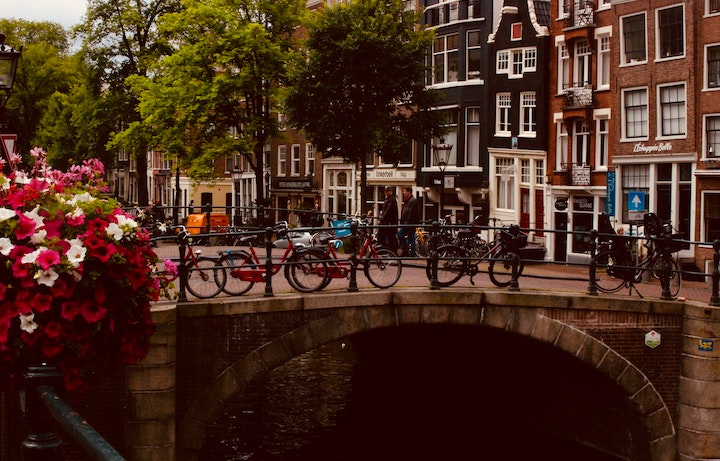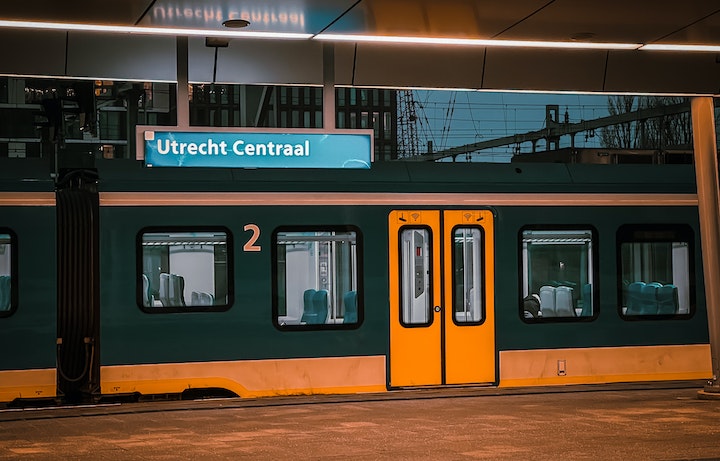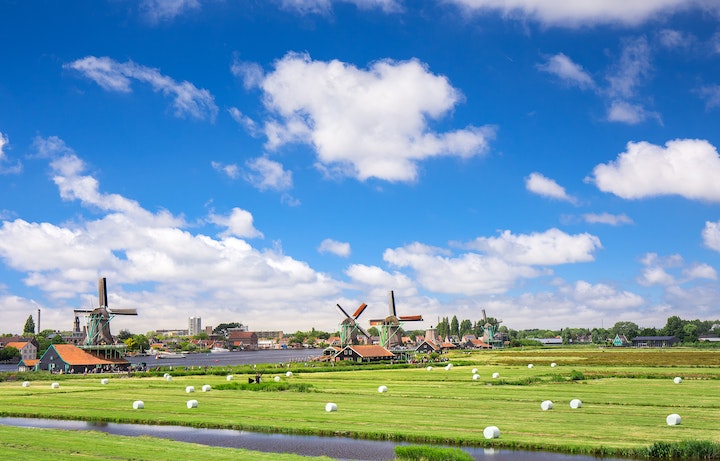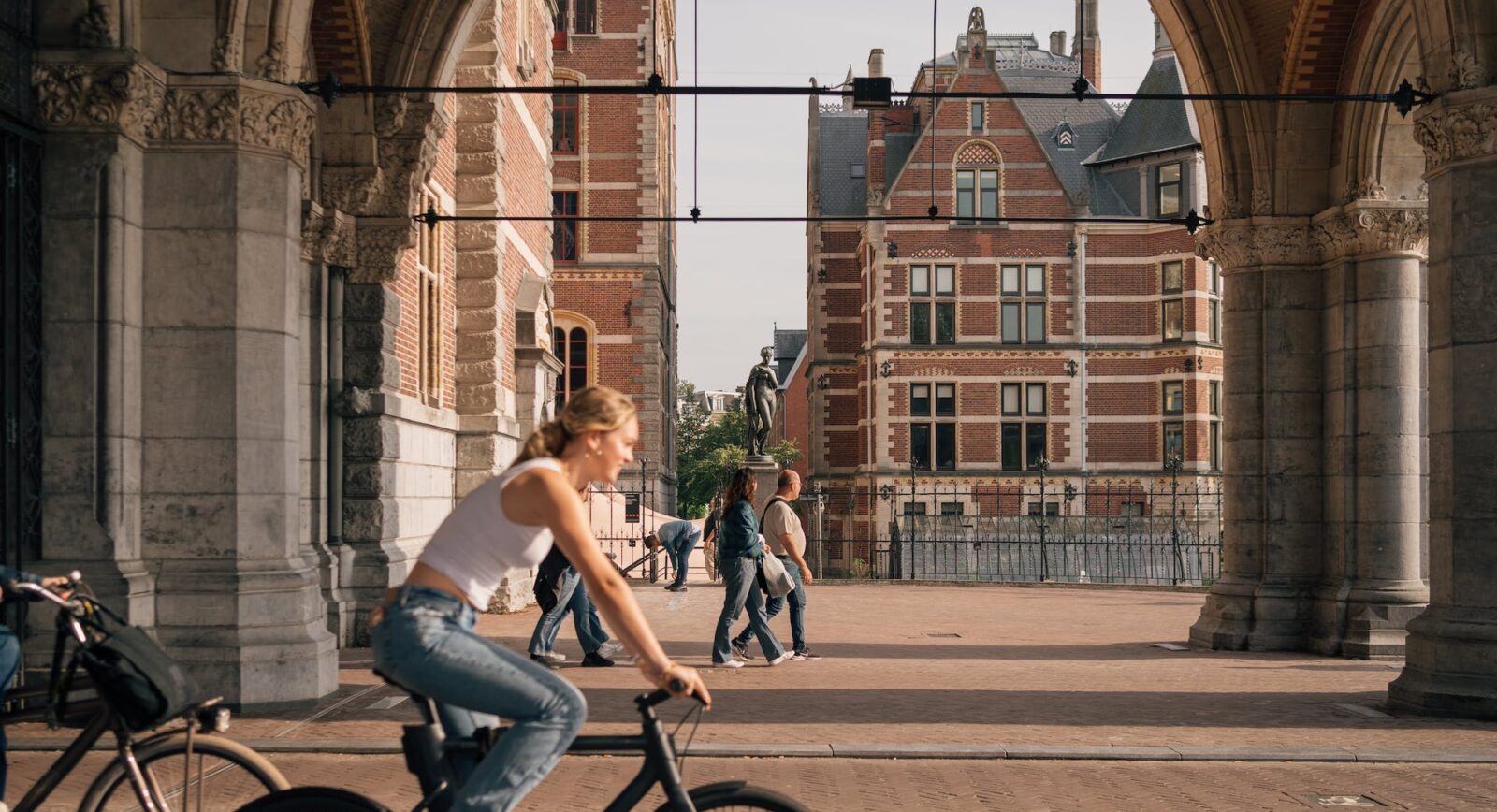What does living in the Netherlands mean for you? From the high quality of life and various job opportunities to the ease of speaking English and a rich cultural tapestry, this article provides a clear overview for anyone considering a move.
Learn the essentials and what truly sets Dutch living apart, offering you a preview of a society where efficiency and enjoyment go hand-in-hand—all without overwhelming you with detail.
Key Takeaways
- The Netherlands offers a high quality of life, including a world-class healthcare system, high-quality education, and excellent work-life balance, making it an attractive destination for foreign workers.
- The Dutch economy, with low unemployment rates, presents plentiful job opportunities across various sectors for skilled foreign workers, coupled with laws supporting a healthy work-life balance and decent minimum wage adjustments.
- The Netherlands stands out for its effective public transportation, high levels of English proficiency among the populace, multicultural environment, and accessibility to other European countries.
Understanding the Dutch Way of Life

The Netherlands, fondly known as the ‘low countries,’ is a testament to a society that values structure, tolerance, and openness. Respect, integrity, and self-discipline are the pillars that uphold Dutch society, creating a nurturing environment for both natives and foreigners alike.
At the heart of Dutch life is the concept of ‘gezelligheid,’ a term embodying cosiness, conviviality, and social pleasure derived from spending time with loved ones. This spirit of camaraderie and communal enjoyment is a testament to the warm and inviting nature of the Dutch.
Dutch social norms are friendly and conversational, accepting of foreigners. The Dutch take pride in building relationships, marked by a pragmatic approach to social policies, including the notable drug policy.
Moving to the Netherlands might mean adapting to the weather, known for its frequent cloud coverage and rain, with up to 300 cloudy days a year. Yet, the locals have adapted effortlessly, preferring raincoats over umbrellas, and the infrastructure is designed to manage the climate efficiently.
In Dutch society, everyone’s opinion matters. Meetings often encourage open dialogue, where individuals express their thoughts directly, fostering a culture of constructive criticism.
This direct communication style is a reflection of Dutch society’s commitment to transparency and honesty, a trait that’s highly appreciated in both professional and personal spheres.
1. High Quality of Life
If there’s one thing that sets the Netherlands apart, it’s the high quality of life it offers its residents. The excellent healthcare, education, and social services in the country contribute to a high standard of living that’s hard to match.
Dutch healthcare is renowned for its effectiveness and accessibility, ensuring everyone, from a child to a senior citizen, has access to top-notch medical services. The education system is equally commendable, providing high-quality education that lays a strong foundation for an individual’s overall development.
High wages in the Netherlands help balance the relatively high-income tax rates, making the overall financial situation manageable for residents. However, the high quality of life isn’t limited to healthcare and education.
The Dutch have mastered the art of work-life balance. They understand that life isn’t just about work; it’s about enjoying the little moments, spending time with family, and taking care of one’s health. This balanced approach to life results in a happy, content, and productive society, making the Netherlands an attractive destination for foreign workers seeking a balanced and fulfilling personal life.
2. Healthy Work-Life Balance
In a world where the lines between work and personal time are often blurred, the Netherlands stands out with its emphasis on a healthy work-life balance. In fact, the country is ranked third out of 38 countries for work-life balance by the OECD Better Life Index, with only about 0.4% of Dutch employees working very long hours. This isn’t a mere coincidence but a result of the cultural values that Dutch society upholds.
The Dutch government plays a significant role in fostering a healthy work-life balance among its citizens. It has implemented laws on maximum working hours and promotes the ‘polder model,’ a consensus-based decision-making model that takes into account everyone’s interests.
The typical weekly working hours in the Netherlands are around 32 to 36 hours, allowing for a reduced workload and a focus on personal lives. This understanding that the traditional 9-to-5 work structure doesn’t always align with the diverse needs of individuals has led to the embrace of flexible work arrangements.
Moreover, Paid Time Off (PTO) is a fundamental aspect of employment in the Netherlands, with a legal minimum of 20 days per year and additional vacation pay, ensuring that the Dutch enjoy ample leisure time.
3. Strong Economy and Job Market
The Netherlands has a strong economy that provides fertile ground for businesses to thrive and individuals to prosper. The country’s strong economy is a result of its well-developed infrastructure, efficient government policies, and highly skilled workforce.
In 2024, the average annual salary for an individual employed in the Netherlands will be €44,000 annually or €3,666 monthly, according to the Dutch Central Planning Bureau. Despite the high-income tax rates in the Netherlands, the generally high wages balance out the tax burden, making it manageable for most workers.
Key blue-collar industries such as agriculture, logistics, and production, to name a few, offer many opportunities for skilled foreign workers to work in the Netherlands. Low unemployment rates and career growth opportunities make the Netherlands an attractive destination for foreign workers seeking to improve their careers and finances.
Whether it’s a multinational corporation or a family-owned business, the Dutch job market offers a diverse range of opportunities, catering to different skill sets and career aspirations.
Managing Cost of Living in the Netherlands as an Expat
The cost of living in the Netherlands can be high, but careful budgeting helps manage expenses effectively. Housing, food, and transportation are significant components of the overall cost but can be reduced through employment agencies if you’re moving to Holland for work.
Some would argue that one of the disadvantages of living in the Netherlands is the high price of accommodation. The rental market varies significantly, with higher rents in cities and more affordable options in rural areas, fully embracing the charm of Netherlands village life.
In the Netherlands, you can find temporary housing solutions such as serviced apartments and short-term rentals if you need immediate accommodation upon arrival while you look for affordable housing. Shopping at local markets and using public transport can further help manage your living expenses.
Increasing Earnings as a Foreign Worker in the Netherlands
In the Netherlands, foreign workers have many opportunities to increase their earnings. For instance, opting for shift work often comes with shift differentials or premium pay rates, thereby increasing the earning potential. Overtime opportunities also offer a way to earn more, thanks to the higher pay per hour for overtime work.
Furthermore, growing one’s experience and expertise can lead to higher earnings. As foreign workers gain the ability to negotiate better terms or apply for more advanced positions, their earning potential increases.
The Netherlands follows a progressive approach to the minimum wage, adjusting it biannually to keep up with the cost of living and inflation rates. This approach ensures that workers are adequately compensated for their efforts, contributing to their overall job satisfaction and financial stability.
4. Social Safety Nets
The Netherlands prides itself on its strong social safety net, which plays a major role in supporting individuals and families during various life stages and situations.
This safety net encompasses a range of benefits that contribute to society’s overall welfare and stability.
Unemployment Benefits
Dutch social safety nets help ease the burden of unpredictable situations such as job loss. As an unemployed citizen and resident, you will receive unemployment benefits and financial support while you search for new jobs. The government also offers programs that equip you with valuable skills and support to get back on your feet quickly.
There are eligibility requirements, of course. To qualify, you need to have recent work experience meeting a minimum number of hours. Another important criterion is that job loss cannot be due to your own actions.
Maternity Leave
To help new mothers bond with their babies and adjust to parenthood, the Netherlands offers generous maternity leave extending up to 16 weeks. This leave package includes at least 10 weeks of maternity leave after childbirth and 6 weeks of pregnancy leave before the due date. During this time, a portion of their salary is paid, allowing them to focus on their families without financial stress.
Childcare Support
To help parents achieve work-life balance, the Dutch government offers childcare subsidies and allowances. These financial supports significantly reduce childcare costs, making it easier for families to afford high-quality care while pursuing their careers.
5. Variety of Options for Visas and Work Permits
Whether you already have a job waiting for you in the Netherlands or you’re just starting your job search, obtaining a visa, work permit, and residence permit is an important step in the process.
EU citizens do not need visas to live and work in the Netherlands, which means that preparing the necessary documentation usually takes around 15 minutes and they can easily relocate to Holland.
For non-EU citizens, the Netherlands offers several types of visas to cater to the different needs of immigrants:
- Highly Skilled Migrant Visa – This visa is designed for professionals with specialised skills who are employed by Dutch companies. It allows them to work and live in the Netherlands with their families.
- Working Holiday Visa – This visa is for young people (usually aged 18-30) from certain countries who want to holiday and work in the Netherlands for up to one year. It enables them to experience Dutch culture while earning money to support their stay.
- Startup Visa – This visa is for entrepreneurs who wish to start an innovative business in the Netherlands. It allows them to reside in the country for one year to develop their startup, with the possibility of extension.
- Intra-Corporate Transfer (ICT) Permit – This permit is for employees who are temporarily transferred by their company to a Dutch branch. It applies to managers, specialists, and trainees.
- Search Year (Orientation Year) Visa for Graduates – This visa is for international graduates from Dutch universities or the top 200 universities worldwide. It allows them to stay in the Netherlands for up to one year to find a job or start a business.
- Regular Paid Employment Visa – This visa is for individuals who have a job offer from a Dutch employer. It requires the employer to prove that no suitable candidates were found within the EU before hiring a non-EU citizen.
- Au Pair Visa – This visa is for young people who wish to live with a Dutch host family and help with childcare and light housework. It allows them to stay for up to one year.
Luckily, moving to Holland is a straightforward process for EU citizens, and for those who are not – there are systems in place that ensure you know exactly what’s required from you to obtain these documents and legally live and work in the Netherlands as an expat.
6. Dutch Pension System

Foreign workers in the Netherlands can generally participate in the same pension system as Dutch citizens. Specific details might vary depending on factors such as employment status, how long you stay, and your home country.
The Dutch approach to retirement security is built on three pillars, each fulfilling a specific role in supporting retirees financially.
State Pension
The first pillar is the state pension, called the “AOW pension” (Algemene Ouderdomswet). The government provides this as a mandatory universal plan. You qualify for the AOW pension based on your age and residency. It guarantees a basic income to all Dutch residents upon reaching a certain age, currently 66 and gradually increasing to 67. The Dutch pension fund aims to establish a foundation for retirees’ financial well-being.
Foreign workers residing in the Netherlands also qualify for the state pension if they meet the criteria. The key factor is how long you have been living or working in the Netherlands. The rules may differ for citizens from EU/EEA countries compared to non-EU/EEA countries.
Many bilateral social security agreements exist between the Netherlands and other countries to ensure that pension entitlements earned in one country are recognised in the other.
Occupational Pension Scheme
The second pillar consists of occupational pension schemes. These employer-sponsored plans are negotiated collectively between employers and labour unions. They are mandatory for most employees and designed to supplement the state pension. Both employers and employees contribute to these plans.
Just like Dutch workers, foreign workers employed in the Netherlands may also be enrolled in occupational pension schemes. These schemes are often mandatory and provide supplementary retirement benefits.
If a Dutch company employs you, they might automatically include you in their company’s pension plan, with contributions coming jointly from you and the employer. There might be specific rules or arrangements for short-term foreign workers, depending on the employment duration and any existing social security agreements.
Private Supplementary Pension Plans
The third pillar is private supplementary pension plans, also known as individual or voluntary pension savings. These plans are entirely optional and meant to complement state and occupational pensions.
Individuals can contribute to these plans on their own and receive tax benefits for doing so. The contributions are invested, and the accumulated savings form an additional source of income during retirement.
Foreign workers, especially those with long-term residency or employment plans in the Netherlands, can contribute to private supplementary pension plans.
7. English Proficiency
Moving to a new country can be daunting, especially when it comes to overcoming the language barrier. However, in the Netherlands, this is less of a concern. The Netherlands is renowned for its high level of English proficiency. Even though English isn’t the official language, almost 95% of the population in the Netherlands speaks English, making it a welcoming environment for international job seekers.
The municipality of Amsterdam even recognises English as an official language, although with a lower status than Dutch. This widespread English proficiency is essential for seamless communication between businesses and their global partners or clients, making it easier for foreign workers to integrate and communicate. Moreover, many higher education courses in the Netherlands are taught in English, providing an enriching academic experience for local and international students.
This widespread English proficiency facilitates the civic integration process of foreign workers into Dutch society, easing the transition from their home country to the Netherlands while also helping them meet the Dutch civic integration requirements without the need to master the Dutch language or speak Dutch.
8. Multicultural Environment
The Netherlands is a melting pot of cultures, a testament to its welcoming and open-minded society. The multicultural environment in the Netherlands is a reflection of its inclusive society that embraces diversity. Dutch people are straightforward and friendly, and they value the unique perspectives and experiences that foreign workers bring to the table.
The presence of international communities and expat networks further enriches the multicultural environment. These communities provide a platform for foreign workers to connect, share experiences, and form lasting friendships. The Dutch government actively makes laws that benefit both residents and foreigners in the country, ensuring equality and fairness.
This multicultural environment fosters a sense of belonging among foreign workers, making them feel at home in the Netherlands.
9. Efficient Public Transportation

One of the many perks of living in Holland is its efficient public transportation system. The country provides a comprehensive and reliable public transport system that includes:
- Trains
- Buses
- Trams
- Metros
- Ferries
- Public bikes
This extensive network of public transportation facilitates easy commuting within major cities and across the country, making daily travel convenient and hassle-free for foreign workers who have their citizen service number.
Moreover, the Netherlands is famous for its bicycle culture. The country is dotted with numerous bike lanes, making cycling a popular and eco-friendly mode of transport. Whether it’s commuting to work or exploring the picturesque Dutch landscape, cycling is an integral part of Dutch life that contributes to a healthier and more sustainable lifestyle.
10. Safe and Clean Cities
Safety and cleanliness are two key aspects that make Dutch cities a desirable place to live and work. The Netherlands is known for its well-maintained infrastructure and public spaces, contributing to the cleanliness and aesthetic appeal of its cities. Whether it’s the bustling city of Amsterdam or the charming town of Groningen, recognised as the healthiest city in the Netherlands, every corner of the country exudes cleanliness and orderliness.
Furthermore, the Netherlands boasts low crime rates, ensuring the safety of its residents. The Dutch government and local authorities are committed to maintaining security and public order, making it a safe haven for foreign workers.
The well-planned urban spaces, environmental initiatives, and emphasis on cleanliness contribute to the overall quality of life in Holland, making it an attractive destination for foreign workers.
11. Leader in Sustainability

The Netherlands is a frontrunner in sustainability, actively working to shrink its carbon footprint and safeguard the environment.
Renewable energy sources like wind, solar, and biomass take the main focus in Dutch energy production. Those iconic Dutch windmills have transformed into modern wind farms, generating significant amounts of clean power.
This commitment is evident in the job market too. Robin partners with many agencies to recruit for positions in solar panel installation, recycling, and eco-friendly house construction.
The country’s urban planning reflects its eco-friendly values. Green architecture flourishes in many Dutch cities, incorporating features like living roofs, green spaces, and sustainable building materials.
Beyond energy, the Netherlands prioritises waste reduction and recycling. Many Dutch cities boast advanced waste separation and recycling programs, making it effortless for residents to participate in sustainable waste management practices.
The Dutch government set an ambitious goal of becoming carbon neutral by 2050, and various policies, incentives, and regulations are in place to encourage sustainable practices across industries and communities.
12. Good Health Insurance and Dutch Healthcare System
Healthcare is a priority in the Netherlands, with the country operating under a mandatory basic health insurance system. Every resident and worker in the Netherlands is legally required to have standard health insurance, ensuring everyone can access necessary medical care and services.
Despite the mandatory nature of health insurance, the premiums are reasonably priced, averaging €1,661.40 per year in 2023, which is approximately €135 per month.
The Dutch healthcare system, which includes Dutch health insurance, covers a variety of medical services, such as:
- Appointments with doctors
- Hospital stays
- Surgeries
- Emergency treatment
There is a deductible known as ‘eigen risico’, which totals €385, that patients must pay out-of-pocket for primary care before the insurance covers the remaining costs.
This comprehensive health insurance system ensures that all residents and workers in the Netherlands have access to high-quality healthcare services, contributing to their overall well-being.
13. Education for All Ages and International Schools

The Dutch take pride in their education system, which offers high-quality learning opportunities for individuals of all ages. In the Netherlands, children must start their compulsory education at age 5, but it’s common for them to begin primary education at age 4.
The education system in the Netherlands is categorised into four types:
- Public
- Religious
- General-special (neutral)
- Private
These categories offer a diverse range of educational settings to meet the varying needs of the student population.
Moreover, expatriate families living in the Netherlands have the option of enrolling their children in either international schools or Dutch local schools, including the Dutch school system.
One such option is an international school, which offers a diverse and global curriculum.
The grading system in Dutch education ranges from 1, indicating very poor performance, to 10, for outstanding achievements. This high standard of education provides a strong foundation for children and contributes to the overall quality of life in Holland.
14. Rich Cultural Heritage
The Netherlands is a treasure trove of cultural heritage, with a rich history and vibrant arts scene that captivate locals and foreigners alike. From the Van Gogh Museum and Anne Frank House to the Rijksmuseum, these cultural attractions are significant not only to Dutch heritage but also to all foreigners living in the Netherlands.
The cultural experience in the Netherlands is not just confined to museums. The country celebrates several key events that offer a glimpse into the Dutch way of life. Public holidays and events like King’s Day, Carnival, and Sinterklaas are not just celebrations but opportunities for expats to immerse themselves in local culture and social life.
The nightlife in Holland is lively and diverse, offering different entertainment options. From exploring the nightlife in the Netherlands to enjoying the rich cultural heritage, there’s always something to engage in.
15. Exploring Europe from the Netherlands
Living in the Netherlands offers the perfect opportunity to explore other European destinations. The country’s strategic location and well-connected public transport system make it easy to travel to various parts of Europe. Nearby European destinations such as Belgium, Germany, and France can be conveniently accessed from the Netherlands via high-speed trains, buses, and budget airlines.
This ease of travel not only enriches the experience of living in the Netherlands but also opens up a world of opportunities for cultural exploration and adventure. Whether it’s a quick weekend getaway to the romantic city of Paris or a cultural tour of Berlin, exploring Europe is just a train ride or a short flight away when you’re in the Netherlands.
16. Foodie Adventures and Dutch Cuisine
The Netherlands offers a culinary journey that’s as diverse and enriching as its cultural heritage. Traditional Dutch cuisine is hearty and substantial, aligning with the country’s cold climate. Classic dishes like pea soup, stamppot, and large pancakes exemplify the Dutch’s love for comfort food.
For a true taste of Dutch food culture, expats can try traditional foods like herring, stroopwafels, and poffertjes at various local markets and restaurants.
Food plays a significant role in Dutch culture and social life, bringing people together and fostering a sense of community.
Whether it’s gathering around for a communal meal or enjoying a cosy afternoon at a local café, food is at the heart of Dutch social life. These foodie adventures further enrich the experience of living in the Netherlands, offering a taste of Dutch culture and tradition.
Take Your First Step Towards Living in the Netherlands
As we navigate through the captivating journey of Dutch life, it’s evident why the Netherlands is a popular destination for foreign workers. If you want to live and work in Holland, our recruiters can help you with that.
With over 40,000 successful job placements abroad, we help foreigners looking for career growth and job opportunities in the Netherlands.
We work with over 35 trusted employment agencies in the Netherlands, guaranteeing fair and well-paid work abroad opportunities for blue-collar candidates holding EU passports.
Our recruiters will help you with the entire process, from finding a perfect job opportunity to settling into your new role. With Robin, not only do you get a job, but you also get a seamless transition to your new life in the Netherlands.
So, are you ready to embrace the Dutch way of life?
Create your profile on our website and let us do all the rest!
Frequently Asked Questions
What is the average annual salary in the Netherlands?
The average annual salary in the Netherlands is €34,260 annually or €2,855 monthly, based on data from 2023. The generally high wages in the Netherlands balance out the high income tax rates, making them ultimately manageable.
How is English proficiency in the Netherlands?
English proficiency in the Netherlands is high, with almost 95% of the population speaking English, which makes it an attractive option for international job seekers.
What is the work-life balance like in the Netherlands?
The work-life balance in the Netherlands is ranked third out of 38 countries, with a very low percentage of employees working long hours. This indicates a favourable balance between work and personal life for workers.
How can I increase my earnings in the Netherlands?
To increase your earnings in the Netherlands, consider opting for shift work, taking advantage of overtime opportunities, and growing your experience and expertise. These steps can help you enhance your income significantly.
Are Robin’s services free?
Yes, all our services for job seekers are entirely free! If you’re a blue-collar worker looking to start working and living in the Netherlands, register on our website and let us help you find your ideal job opportunity in Holland.
Is the Netherlands a good place to live?
The Netherlands is widely regarded as a great place to live due to its high standard of living, excellent healthcare system, and strong emphasis on work-life balance. The country’s efficient public transportation, safety, and vibrant cultural life also contribute to its appeal as a residential choice for people from around the world.
How much money do you need to live comfortably in the Netherlands?
To live comfortably in the Netherlands, it’s estimated that a single person would need between €2,000 and €2,500 per month, while a family of four would likely need around €4,500 to €5,000 per month. These figures take into account housing, food, transportation, healthcare, and leisure activities, but can vary depending on lifestyle and location within the country.
Can foreigners live in the Netherlands?
Yes, foreigners can live in the Netherlands. The country is known for its welcoming attitude towards expats and has a sizeable international community. Foreigners looking to reside in the Netherlands will need to comply with immigration regulations, which may include obtaining a residence permit or visa, depending on their nationality and purpose of stay.
What is the quality of life in the Netherlands?
The quality of life in the Netherlands is considered to be one of the highest in the world. Residents benefit from a comprehensive healthcare system, a high level of education, a clean and safe environment, and a multitude of cultural and recreational activities. The Dutch also value social equality, which is reflected in their progressive social policies and overall happy and healthy population.
Are Dutch people friendly?
Dutch people are generally friendly and welcoming, making life in the Netherlands for foreigners pleasant. Living in the Netherlands as an expat, you will often find the locals speaking English fluently and open to helping you integrate into the community.
What can I expect from the first days of expat life in the Netherlands?
Your first days of living in the Netherlands as a foreigner will be about settling up in a new country and a role if you moved there for work. Upon your arrival, you must register with local authorities and obtain a BSN (citizen service number) to be able to access various official services in the Netherlands. The next step would be to open a bank account so that you can make financial transactions and receive a salary.

 English
English  Lietuvių
Lietuvių  Latviešu
Latviešu  Polski
Polski  Português
Português  Română
Română  Slovenčina
Slovenčina  Magyar
Magyar  Русский
Русский  Espanol
Espanol  България
България  Čeština
Čeština  Italy
Italy  Croatia
Croatia  Greek
Greek 

